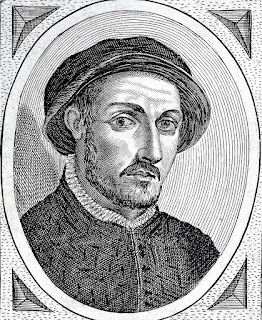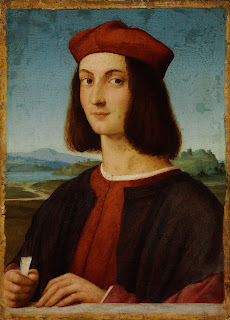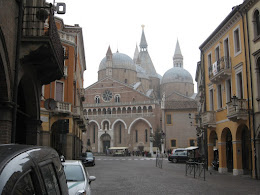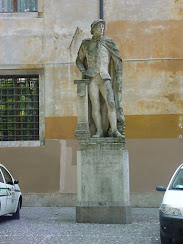Actor and dramatist with a genius for comedy
 |
| Angelo Beolco's plays were written in Paduan dialect spiced with vulgarities |
Beolco was famous for his rustic comedies, which were written mostly in the Paduan dialect of the Venetian language.
Many of his plays featured a peasant called Ruzzante and they painted a vivid picture of life in the Paduan countryside during the 16th century.
Beolco was born in Padua in 1496 and was the illegitimate son of a doctor. His mother was possibly a maid in the household where he was brought up by his father. He received a good education and after his father’s death became manager of the family estate. In 1529, he also became manager of a farm owned by a nobleman, Alvise Cornaro, who had retired to live in the Paduan countryside. Cornaro later became Beolco’s friend and protector.
Beolco met and associated with Paduan intellectuals of the time, such as the poet Pietro Bembo and the scholar and dramatist Sperone Speroni, which led to him developing an interest in the theatre.
His first attempts at acting and writing plays may have been delivering impromptu sketches at wedding parties.
It is established that in 1520 he was already known as Ruzzante and that he played a role in a play put on at a palace in Venice. It was after this that he put together his own theatrical troupe. His first plays were staged in Ferrara between 1529 and 1532 and then later in Padua at the residence of his friend, Cornaro.
 |
| Beolco was a friend of the poet Pietro Bembo (above) |
Much of the play’s comical effect comes from the contrast between the two languages, which provides the opportunity for misunderstandings and plays on words.
One of the characters is a physician, who earns the gratitude of Ruzzante for prescribing a fatal medicine to his stingy father. This unites the young peasant with his long-awaited inheritance.
In his later plays and monologues, Beolco shifts more to the Venetian language, while maintaining his social satire.
In the Oratione, a welcome speech for Bishop Marco Cornaro, who was later to become the 59th Doge of Venice, he suggests measures the new prelate should consider for improving the life of the peasants, including castrating the priests, or forcing them to marry, in order to give peace of mind to the local men and their wives.
Beolco’s plays were sometimes considered unfit for educated audiences because of the lascivious themes and vulgar language and this occasionally led to performances being cancelled.
In one of his best-known pieces, Il parlamento de Ruzante, the character tells of his return from the Venetian war front only to find that he has lost his wife, land and honour. The speech begins with Ruzzante’s favourite expletive.
Linguistic studies have concluded that Ruzante’s speech was not an accurate record of Paduan dialect of the day, but to some extent, a theatrical dialect created by Beolco.
Playwright Dario Fo put Beolco on the same level as the French playwright, Molière, claiming that he is the true father of the Venetian comic theatre (commedia dell’arte) and said that he was the most significant influence on his own work.
Beolco wrote at least 11 plays and monologues, but died in Padua when he was in his late forties, while preparing to stage a play by his friend, Speroni, for the Accademia degli Infiammati. Despite his theatrical success, Beolco was very poor for most of his life. Speroni once remarked that, while Beolco had an unsurpassed understanding of comedy, he was unable to perceive his own tragedy.
 |
| The Basilica di Sant'Antonio is one of Padua's most impressive sights |
Padua, where Angelo Beolco was born and died, is in Italy’s Veneto region, situated 52km (32 miles) to the west of Venice. Padua is close to the stunning Euganean hills and many of the Venetian villas designed by architect Andrea Palladio. It is home to the second oldest university in Italy, the magnificent Basilica di Sant’Antonio, and one of the world’s greatest art treasures, the frescoes by Giotto in the Cappella Scrovegni, which tell the life stories of the Virgin Mary and Christ.
 |
| The Ruzzante statue next to Padua's Teatro Verdi |
There is a statue of Angelo Beolco (Ruzzante) next to the Teatro Verdi in Padua. The beautiful 18th century theatre, named after the composer Giuseppe Verdi, is in Via del Livello in the centre of the city, close to Piazza dei Signori. Teatro Verdi now presents operas, musicals, plays, ballets and concerts organised by the Teatro Stabile del Veneto.
Also on this day:
1826: The birth of inventor Innocenzo Manzetti
1861: The proclamation of the Kingdom of Italy
1925: The birth of actor Gabriele Ferzetti
1939: The birth of football coach Giovanni Trapattoni